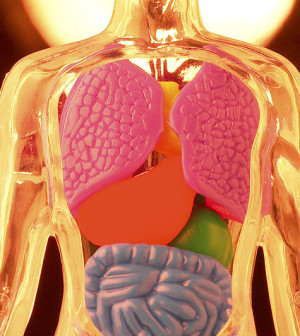- Could Your Grocery Store Meat Be Causing Recurring UTIs?
- Are You Making This Expensive Thermostat Error This Winter?
- Recognizing the Signs of Hypothyroidism
- 10 Strategies to Overcome Insomnia
- Could Artificial Sweeteners Be Aging the Brain Faster?
- Techniques for Soothing Your Nervous System
- Does the Water in Your House Smell Funny? Here’s Why
- Can a Daily Dose of Apple Cider Vinegar Actually Aid Weight Loss?
- 6 Health Beverages That Can Actually Spike Your Blood Sugar
- Treatment Options for Social Anxiety Disorder
Non-English Speakers Less Likely to Be on Kidney Transplant List

Language barriers may prevent some eligible U.S. patients from receiving a kidney transplant, a new study suggests.
Specifically, those who don’t speak English may be less likely to complete the kidney transplant evaluation necessary for them to be placed on a waiting list for a kidney from a deceased donor.
For the study, researchers analyzed data from kidney failure patients across the United States. The investigators found that patients who lived in neighborhoods where more than 20 percent of households didn’t speak English were 29 percent less likely to be on a kidney transplant waiting list than those in neighborhoods where less than 1 percent of households didn’t speak English.
Although the study can’t prove a cause-and-effect relationship, the researchers found the link between not speaking English and not being on a kidney transplant waiting list was strongest among Hispanic patients.
The research was published online Feb. 9 in the Clinical Journal of the American Society of Nephrology.
“Our data suggest that language barriers may limit an individual’s ability to receive a kidney transplant,” study co-leader Dr. Ed Huang, of Cedars-Sinai Medical Center, in Los Angeles, said in a journal news release.
Huang said the researchers recommend that patients who have limited English proficiency and need a kidney transplant use English-speaking patient advocates and interpreters during transplant clinic visits.
“Further, transplant centers and health care providers should actively address potential communication barriers when recommending testing for transplant evaluation,” Huang added.
More information
The U.S. National Institute of Diabetes and Digestive and Kidney Diseases has more on kidney transplantation.
Source: HealthDay
Copyright © 2026 HealthDay. All rights reserved.










